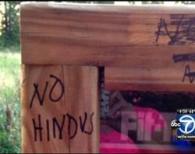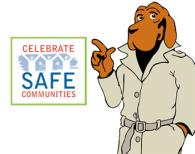Not In Our Town Leader Elevates Student Voices
In Bowling Green, OH, both the town and the local university have actively targeted racism and intolerance through respective Not In Our Town and Not On Our Campus campaigns. At the helm of these efforts stands Ray Plaza, co-chair for the Bowling Green Not in Our Town initiative and associate director for the Office of Multicultural Affairs at Bowling Green State University.
Students praise Plaza’s resolve to include voices from all parts of the campus, and count him as an invaluable ally in the university administration.
Blog

October 13, 2014 - 3:47pm

October 13, 2014 - 2:58pm
October is National Crime Prevention Month! We are so proud to partner with the National Crime Prevention Council, which has been taking a bit out of crime for 30 years.
The Council featured Not In Our Town during this second week of National Crime Prevention Month with the theme, "Raise Your Voice to Stop Hate."

October 9, 2014 - 5:16pm
Today we introduce a short film series called Ferguson Conversations.
Not In Our Town's film team has been covering events in Ferguson, Missouri following the fatal shooting of unarmed teen Michael Brown by a police officer on Aug. 9. This tragic event has sparked conversations and marches both in the St. Louis area and nationwide. These first two short films shine a light on the community of Ferguson.

October 8, 2014 - 9:04am
Colin, who is featured in the music video Carry On by Galvanized Souls, experienced relentless bullying at school. Read his heartwarming story that touched over 2 million people around the world. In this blog, you can also watch the story behind Galvanized Soul's music video for Carry On. Learn more about National Bullying Prevention Month to discover what you can do to be an upstander and prevent bullying in your school.

October 3, 2014 - 2:14pm
By Ilana Fonariov
"I really wanted to see a change in my school site where there was a lot of bullying and name-calling happening. Issues included low self-esteem, teasing, and girls getting mocked for dressing like tomboys," said Jasmine Frye, the student support specialist for an after-school program at an east Oakland elementary school, located in a low-income Latino community. She came to the school by-way of Bay Area Community Resources and Americorp, right after completing her sociology degree at UC Davis.